When I was younger, I often felt self-conscious and socially awkward. In fact, one of the reasons I wanted to become a Behavioral Scientist was to be better socially.
If you often feel anxious and embarrassed, this guide is for you. It will give you the tools you need to be more relaxed in social settings, get out of your head and into the conversation.
This guide is for anyone who’s feeling overly self-aware, but examples are geared toward adults in work or at college.
Note: Sometimes, the underlying reason for self-consciousness is social anxiety. If this is the case for you, here’s our list of the best books on social anxiety.
Let’s get started!
1. Focus on someone or something
Self-consciousness comes from being overly concerned with how people see us. We worry that we won’t be seen as smart, attractive, or that others are judging us.
It can be exhausting, and with too little evidence to support the argument in either direction, we go straight to the most negative conclusion.
To get out of this pessimistic mindset, try shifting your attention to the people around you and your environment.
Focus not on what others think of you but on learning about the people you’re with. Make it a point to find out one thing about every person you meet. It could be their job, their major, or what they did on the weekend.
The objective is to get out of your head. Put that energy into the people around you rather than into feeding an inner dialogue that’s holding you back.
2. Question your inner critical voice
It’s easy to believe the negative voice inside our head is always right. But have you tried questioning it? You might find out that it has little to do with what’s real.
Check the evidence from your life:
Can you recall a time you did something that proves your inner critic wrong? For example, if your voice says, “I always mess up around people,” remind yourself of a time when you did just fine.
Ask yourself if what you are feeling is reasonable. Or, are you letting a perception you think others have of you, run the story in your head?
3. Know that people notice you less than you think
In an experiment, students were asked to wear an embarrassing t-shirt.
By the end of the day, the students who wore the shirts estimated that 46% of the class had noticed. When polled, only 23% of their mates actually had.[1] In other words, their embarrassing t-shirt was only half as noticeable as they had thought.
What feels mortifying to us is usually having little to no impact on others. People are caught up in their own thoughts and struggles, too busy to worry about ours. The best thing we can do is remind ourselves that no one cares as much as we do, and even our own filter is not a perfect lens.
4. Know that it’s OK to say some stupid things
I remember talking to a girl I was crushing on when I was in high school. She was talking about how her brother liked a band, and like a crazy person, I said, “Ya, I know.” Like somehow, I knew what group her brother liked. My crush looked at me strangely but kept going.
Did it make any difference to my crush? Not really. At this point, I can laugh about it, but at the time it felt humiliating.
Try turning the tables on the situation. Would you care if someone blurted out something silly? Or would it just pass you by without giving it extra thought? It’s better to talk freely even if you say something stupid every once in a while. The alternative is to always guard yourself, and that can make you come off as stiff and aloof.
5. Don’t try to fight your feelings
Emotions tend to cling harder when we fight them and weaken when we accept them.[2]
When you are anxious, and feeling uncomfortable in a social setting, what are you thinking about? How does thinking about that make you feel? Happy, sad, nervous, jealous? What’s your body doing when you’re in your head and feeling awkward at a party? Are you sweating, jumpy, yawning a lot (a reaction to nerves)?
Simply accept how you feel rather than trying to change it.
Now focus outward. Talk to someone. Ask them how they’re doing. What brings them to this party/event? Do they know anyone? Then check your head. How do you feel when you’re talking to someone? Do you get any less nervous as the conversation goes on? If you were blushing, has it subsided yet?
Practice going back and forth between your inner thoughts and how you feel when you are talking to others. See if you feel better when you’re in your head, listening to your internal dialogue, or when you’re spending your energy on others.
6. Focus on your positive traits
This isn’t “think happy thoughts, and you’ll be fine.” Instead, you want to base your self-worth on your real, positive qualities rather than cynical and questionable self-talk. This is what we know is true:
- You have talents and abilities that give you fundamental value.
- This combination of characteristics makes you unique and memorable.
- You are worth spending time with and knowing.
Try to list your concrete skills like your mathematical ability, you’re a good writer, you’re multilingual, you’re a great cook. Then there are your personality traits. You’re kind, honest, genuine, funny, enthusiastic, etc.
Even if you can’t make a full list today, write one positive quality down every day and then review the list every week. When you have a comprehensive list, read it every day. You’re training your mind to focus on what you do well and to be able to access it quickly.
7. Make sure you’re reading the situation right
Negative experiences can teach us to be on guard and defend ourselves from criticism and hurt. This can affect how we perceive the world and the people we encounter.
Those of us who are overly self-conscious might believe the world will judge us harshly because that is what we’ve experienced. However, as I’ve pointed out, people don’t care that much about how we act or what we say. Every new person you meet thinks of you as a blank slate.
When you’re in a scary social situation, ask yourself, “Is there a chance my past experience is affecting how I’m seeing this interaction? Is there another, more realistic way I can approach his conversation?”
Believe people will be friendly, and most of the time, they will be. If not, it says more about them than you.
8. See yourself as a social observer
People watching is fascinating, and it shows us how our basic humanity makes us all messy, foolish, and funny. Go to the mall, grab a coffee/tea, and watch people walk with their friends. Listen in as they sit beside you and talk, or as they chase their kids down the hall.
Now notice their body language, their tone of voice, and eavesdrop on what they’re saying. What we’re doing is training you to switch your focus from yourself to others and to think objectively about what you’re witnessing.
Are people relaxed or stilted? Is their posture good, or are they slouching? When they talk, are they quiet, or does the volume go up and down with excitement? The more we see others being their imperfect selves, the more we’ll realize this is what ‘normal’ looks like.
Go into this observer mode when you walk into a room of strangers. It can help you be less self-conscious.
9. Assume that people will like you
This one is about the mechanics of being seen as confident rather than inhibited or self-conscious. When we feel uncomfortable, it can make us talk softer, hug our bodies with our arms, and speak faster to get the words out and move the focus off us as soon as possible. It can make us seem aloof, and even if we don’t intend to, it makes us less approachable.
Be confident and friendly right off the bat. Walk up to people with a warm smile and present yourself. If you’re uncertain about the details, look at how likable, confident people do it and learn from them. Assuming people will like you is a self-fulfilling prophecy. Assuming they won’t is, too.
10. Ask about others to take the focus off you
It’s easier to focus on someone else other than ourselves. When you meet someone for the first time, ask them what they do for fun. What are their hobbies, or do they have any pets? Listen carefully, nod, and give them signs that you are enjoying their story. Then add anything relevant that applies from your life. Things like your pets – what kind are they, their name, breed…or your hobbies. At the end of the day, you want to have a balance between learning about them and sharing about yourself.
The goal is to learn about someone else because it’s hard to be self-conscious when you’re focused on getting to know another’s interests and stories.
11. Make internal progress checks, not comparisons
Jealousy is a miserable emotion. It makes you feel small and worthless and sucks the joy out of everything. It’s like anger directed at someone else, but you are the one who feels crappy.
Avoid both overexaggerating someone else’s talents or trying to find flaws in them to make yourself feel better. No one is perfect, and tearing them down when you feel envious just retains the focus on you because you are still comparing yourself to someone else.
Here’s a thought: What if we were OK with the fact that someone is more accomplished than us? When we accept this, it helps us see ourselves differently.
Our value then has nothing to do with how successful we are or how good we are at something. We want to go from “I like myself because I’m good at…” to “I like myself.” (Period.) This makes our self-acceptance unconditional.
How do we accept that others are more accomplished than us and be OK with that? First, let that fact sink in, and allow all your emotions of envy and sadness to come to you. Accept those emotions rather than fight them. Now, you no longer need to fear them. Afterward, you will be less prone to comparisons.
Here’s another way to do it:
Instead of thinking, “Well, at least I’m better than them when it comes to X.” Say, “I’m not good at everything, which is OK because my value isn’t based on my achievements. I have value because I am 100% myself”.
Let’s talk more about how to be more self-accepting…
12. Practice accepting yourself
Self-acceptance is one of the biggest steps we take towards achieving self-confidence.
According to Aaron Karmin, MA, LCPC, a psychotherapist in Chicago, Ill, a person “who accepts [themselves] unconditionally as a worthwhile human in spite of [their] faults and imperfections does not experience the stress of self-consciousness.”.[3]
Here are some things you can do to accept yourself:
- Decide how you are going to live your life. Will you let others define your personal image, your strengths, and your weaknesses? Try to move from blame, doubt, and shame to tolerance, acceptance, and trust.
- Make a list of all your good points.
- What do you do well?
- What are you proud of accomplishing?
- Whose lives have you made better?
- Connections you’ve made with others.
- Hardships you have overcome.
Review the list often, so you see your progress and acknowledge your gifts.
- Take an inventory of the people close to you.
- Are they good for you?
- Do they reinforce negative self-talk?
- Do they criticize or demean you?
Consider eliminating all the negative influences in your life.
- Surround yourself with a positive support group of people who celebrate you.
- Forgive yourself. If you made a mistake, realize you did your best with the information you had at the time, or you simply made a bad choice. But now you chose to move on and forgive yourself.
- Silence your inner critic. Just because it’s hard to hear doesn’t mean it’s right or 100% true. If you wouldn’t talk to someone else like you speak to yourself, why is it OK to do it to you? You’re human like everyone else. Treat yourself as well as you treat anyone else, if not better.
- Move on from your unrealized dreams. You can’t change the past. All you can do is move forward and continue to pursue your current goals.
- Help yourself see how you make others’ lives better. It’s harder to see yourself in a harsh light when you acknowledge all the good you do.
- Let it go – You can’t control everything. It’s not resignation. It’s a realization that your energy is better spent elsewhere instead of railing against the things you can’t change.
- Try to solve your problems one at a time. First, step outside your head where all the worry and self-doubt resides. Take a dispassionate look at what you need to do to move past each issue. You could even try imagining that the problems you’re facing are someone else’s (if that helps you get away from your internal thoughts). Ask yourself what advice you’d give them (yourself) to help?
- Practice Self-compassion – accept your flaws and love yourself anyway. Simple words, but for most of us, it takes years, if not a lifetime to master this step. The more you do it, the better you’ll get in every respect.
- Even though you may not have much experience being kind and compassionate with yourself, you will start to believe these good things you’re telling yourself. Especially if you keep this positive internal monologue up. In many instances, it took years to get to this place of insecurity. It will likely take weeks and months to see progress and make permanent changes to your mental habits.
13. Practice thinking about other’s needs
Try doing thoughtful things for others. Consider their struggles, worries, dreams or regrets. When you do, you take the focus off yourself and you’ll connect with them. This will help you be less self-conscious.[4] It will also show others that you are caring, and you value them. Done selflessly, it will bring good things back to you.
Here are some suggestions:
- Smiling at someone after you meet them. It could be a friend, family member, or acquaintance. Let the smile happen as you talk to them, so they know you are smiling just for them because it grows after you say, ‘Hi.’
- Hold a door for someone.
- Give a spontaneous compliment.
- Bring a friend or co-worker cookies or a pre-made dinner if they are sick or need a pick-me-up.
- Pay it forward. Pay for the coffee or drive-thru meal of the people behind you.
- Keep your area tidy and organized if you work in an open-concept office.
- Send cards for different occasions or for no occasion at all.
- Give someone 100% of your attention and note what they say so you can follow up later. (Ask them how ‘it’ went. Make sure they are OK afterward.)
- Consciously spend a few minutes every day thinking of the things you are grateful for.
A word of caution: Do not do these things to gain others’ approval. That puts the focus back on you. Do it out of sincere consideration for others. The purpose of the exercise is to focus on others and their well-being. When you do, you’ll become more compassionate and less self-conscious.
14. Consider talking to a Therapist
If your self-consciousness is inhibiting you or is a result of social anxiety, a therapist can be helpful. Having social anxiety is more common than we think, and deciding to understand and address the effect it has on your life is brave. A Psychologist or a Therapist will help you talk through your feelings, find out where they originate from, and give you the tools to unpack them and move forward.
We recommend BetterHelp for online therapy, since they offer unlimited messaging and a weekly session, and are cheaper than going to a therapist's office.
Their plans start at $64 per week. If you use this link, you get 20% off your first month at BetterHelp + a $50 coupon valid for any SocialSelf course: Click here to learn more about BetterHelp.
(To receive your $50 SocialSelf coupon, sign up with our link. Then, email BetterHelp’s order confirmation to us to receive your personal code. You can use this code for any of our courses.)
You can also try contacting your insurance company or doctor for recommendations.
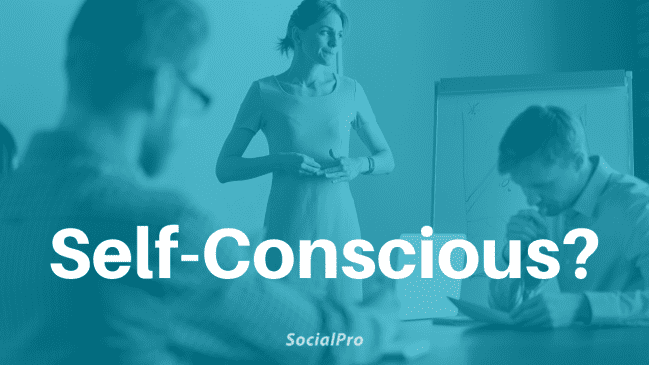





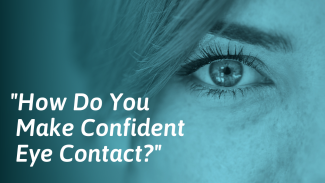
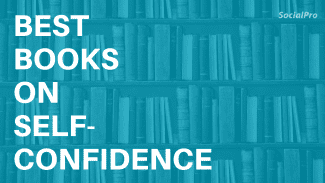
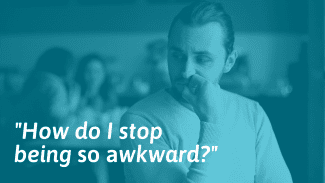

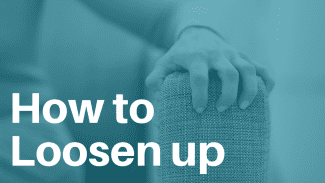
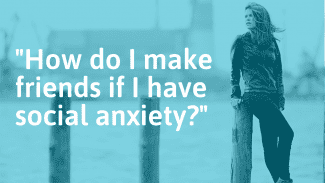
I’m afraid of being judged for not being smart enough or interesting enough. I’m afraid people will think I’m boring. I’m afraid people will look down on me or see me as useless.
My Mind Goes Blank In Social Situations,,,
Same… that’s the biggest problem for me. I can’t even focus on that person and come up with things to say because I just notice surface level things… if anything the conversation I come up with would last 15 seconds and end with awkward silence and walking away regretting even showing my face in the first place
I feel ashamed of being poorer than my friends, of looking less “cool” , lively , brave, dynamic ,open minded and social than people my age.
I iterally feel this way all of the time! Sorry for you though.
Me to . I don’t feel as “cool”as them or as pretty . I also hate being with my friends with other people watching /judging how we act together (grown ups watching) but I know it’s all in my head
When walking into a room full of people my eye’s blink uncontrollably.
I’m afraid of being seen as stupid or just plain weird. It doesn’t help that I have Aspergers and can’t figure out all these unwritten social rules that come naturally to others so I’m afraid of looking like a freak
I am afraid of people looking down on me. They think I am not capable of doing things. They see me as a low life human being. I am afraid not proving that I am smart , I am afraid of looking unimportant, worthless, and more . I am afraid of this because nothing proves that I am better and I know that I am not a great person. I wish that I am funny, social and more but I feel selfish saying these things . So I just not show that I want to be needed.
Everything you said was on point with how I feel about myself. I feel that I’m smarter than how I come off and people treat me like I’m a kid or just plain slow.. I feel like there’s just so many things I do know but they never pop up in my mind when I need them because my anxiety or whatever it may be just clouds all of my thoughts and memories. All I can think about is everything you listed and more. How quiet I am, I feel like a zombie trying to fit in.
you just described my fears word by word 🙂
I’m afraid of being judged by other people.
Afraid of looking like an idiot when I’m in a group.
*unintelligent
I’m afraid of group discussions in class… Afriad of being wrong and looking stupid or incompetent in front of others. I’m scared of what others may perceive me as… timid or unitelligent. I want to become more self-confident and more bold.
in afraid of being judged by my appearance. I’m afraid people will think I’m lazy and not really trying very hard or that I’m arrogant or stuck up. I am terrified of having to stand up for myself to women. or men.
I worry about what people think about me.
I worry incase I say something stupid and cause a lull in the conversation
I overthink just about everything. Especially if it is talking to people. I’m afraid of talking too much and wasting their time. Or what if they actually don’t want to talk to me. What if I accidentally offend them. These are just a few of the things that go on in my head. In the end I just worry the whole time instead of talking to people.
Same here
My main weakness is feeling too self-conscious and nervous when people are talking to you and directing their attention to you. Unless I’m comfortable around the person, it usually results in this uncomfortable, nervous feeling that originates in the gut, and the feeling also causes nervous laughter or smiling very often.
I’m also not comfortable or confident around strangers or girls that I like, to the point where asking someone out or confessing my feelings is a daunting task. Sure one can reply “there’s plenty of fish in the sea” and that it’s just a girl out of many, but if I really do like someone and want to be with a particular person instead of just any girl, her rejection is going to affect me more than asking or confessing to a random cute girl.
My main weakness is feeling too self-conscious and nervous when people are talking to you and directing their attention to you. It results in feeling uncomfortable and some nervous laughter.
I’m also not comfortable or confident around strangers or girls that I like, to the point where asking someone out or confessing my feelings is a daunting task. Sure one can reply “there’s plenty of fish in the sea” and that it’s just a girl out of many, but if I really do like someone and want to be with a particular person instead of just any girl, her rejection is going to affect me more than asking or confessing to a random cute girl.
Oh yeah, I forgot to mention that, regarding what I was talking about in the first paragraph, that the feeling completely goes away if I have physically or mentally exerted myself in some way, as in exercising (physical) or talking in front of a whole crowd (mental). I feel the most loose and at ease when in these states for some reason.
Firstly I’m actually impresses with this so far as I come across many self help that’s aimed at self gain not help so thank you firstly to all that share and help. I’m the same really I feel people will assume I’m a creep if I look at them so I look everywhere but and if an attractive lady is opposite me on train I freak thinking don’t look she will think I’m leering so I state st my phone out the window but anywhere instead of her direction so there’s my fear being judged for being a creep which I’m not but let’s be honest attractive is hard not to look at
I am afraid people judging everything I do..the way I talk…people might think I am so dumb …the way I dress ..how not so fashionable I might be..or how I lack taste ..how I can’t fit in any group at all…I am scared of how people see me when I suggest something. Let’s say in a discussion…I always end up not suggesting anything no matter how correct it is..I feel like they would take my points as the dumbest point ever…it is so frustrating that I prefer being alone..not having many friends.. before I do anything I will always ask myself …what would people think of me…would they like it?
I’m scared of people thinking I’m stupid, as sometimes when I speak I overthink and say things that don’t make sense, cause sometimes I just don’t know what to say.
I’m insecure about almost everything and that’s so annoying. I fear that i’m not witty or smart enough, I’m not ‘cool’ like most people my age, I’m not @ least funny or charming, fun or lively. I feel i’m ‘just there’, u know, dumb, lack sense of humor, normal( as opposed to being lively, spontaneous and fun), bland, boring, uncool and this sucks, it makes me think that immediately i open my mouth to talk people would get uninterested and bored, i feel my talks and conversations are irrelevant and my stories or experiences are sometimes sad. It has consumed me so much that when asked to give my opinion on something I seem not to have any, I can’t even answer a simple question, my mind goes blank or even if i do have an opinion i just keep quiet because i know it wont even matter cause no one would agree, understand or see the angle I’m coming from so i might end up having to explain myself and sounding even dumber, more stupid or weird (boring kinda weird). This makes me overthink what to say, how to say it and i eventually get stuck….. I sometimes think everyone hates me for no reason whatsoever and that has hindered my ability to make friends.
These days i realized that i’m fed up and tired of trying to make friends, get people to like me or at least acknowledge my presence, connect with people… it has become exhausting for me (The thought having to force conversations even when i notice the other party is loosing interest, being forced to stay among a group a of people awkwardly silent and the only thing i can do is smile and laugh while listening to others talk, say insightful things or simply try to be humorous just to lighten the mood and later regret that I was silent and that I should have said something) and i’ve literally given up trying even though it still bothers me like hell.
I know this isnt the best thing for my life coz i still have a long way to go and one needs connections and connecting with people to survive or even make it in life. I try not to let the fact that i don’t really have friends and cant connect with people bother me…. but i can’t. Every now and then it just hits me that i’ve spent over 20 years on earth and i don’t have close friends not acquaintances (coz i think i have a lot of those)… real friends that know me in-depth, understand, accept and respect me the way i am…. in spite my countless flaws. There are people in my life that think we are friends and i observed that the relationship is formal most of the time, they aren’t completely free with me and me with them.
Its is terrifying how much I can relate to this comment. I’m in highschool dealing with this. I’m almost done and it sucks bc I don’t have many friends cant talk and everything is social. I’m 18 btw,
I can relate.. I’m not even close to my own friends and family. There’s so many things I don’t know about them and honestly I don’t even feel like there’s much to know about me.
I fear that I’m not witty or interesting enough and that it’s important to be the class clown as this is heat people remember and are drawn to funny people. I then get so anxious about not being able to pull off being funny that I get tongue tied and then feel like I’ve completely failed. This doesn’t just happen with new people but even with close friends as I fear that friends will notice my awkwardness and get bored of me easily because I’m not funny.
I am really anxious about the way people judge me. Before I even leave the house, I will be full of anxiousness about what people would think about my clothes. When I am talking to people, I always felt really uncomfortable and I didn’t even know what we’re supposed to talk about. I always just answer the question given by the other person with a short answer that made the conversation stop at an awkward silence. Even then, I will be thinking what I should say in that situation and end up never saying anything because I am afraid of how the person will react. The same thing happen with online conversation in Discord or whatever, I rarely participate as I don’t even know what I should talk about.
I can be really judging on people fast. After one mistake. Probaply cause i judge myself so hard. I think everyone hates me for no reason what so ever. And that becomes a handicap in social situations
When asked to give my opinion on something I seem not to have any. I can’t even answer a simple question my mind goes blank
“my mind goes blank” – these are very accurate words. that’s my problem too.
Thank you for your wonderful support. I am most afraid of thinking if i sound interesting enough? is the person talking to me bored because of my irrelevant talks. I feel i maybe sound irrelevant and boring.
Ananya,
I feel this way too, along with the feeling that I’m not funny enough. I even fear that close friends will get bored with me because of this. I try to relax and tell myself that I don’t have to be the most interesting or the class clown for people to love me and try to focus on my good qualities and what I can bring to the conversation ; good listener, kind, non judgmental, empathetic etc.
“I am most afraid of thinking if i sound interesting enough?” – that’s my problem too.
I’m always afraid of saying something really stupid, or that people won’t agree with me, or that I won’t have anything to say at all. It makes me overthink how and what I say and get stuck in this self-perpetuating cycle.
“that I won’t have anything to say at all” – that’s my problem too.
Group convos have never been my thing. Most of the time I either not say anything at all and look unapproachable or I say something so out of left field that I come across as weird. It is so hard for me to find a sweet spot since most of the time group convos are centered around small talk, something I am absolutely terrible at. Whenever it does move past small talk, so many people are chiming in I find it hard to speak up and when I do it is always at the wrong time. Most of the time I just avoid groups of people that I don’t know very well just to save face.
I’m the same way! Small talk is something I’m terrible at, and I find myself stuck in the awkward silence.
Whenever I get into a large group, I always worry that people will not exactly accept me… like they’ll think I’m boring and awkward, possibly even try shooing me off. This makes me feel that I don’t exactly belong there but leaving without saying anything the group will just be weird. This makes me forced to stay in the group, awkwardly silent as I see others talk and laugh. Later, I regret that I was silent and that I should have said something… thought that I was overthinking and should’ve said a line or two. Maybe I might’ve been accepted and thought to be the “fun guy” of the group. But whenever I get into the same or another group, I come back to the awkward silence. I try thinking of what to say, but when I try to, the words just don’t come out of my mouth. I just can’t improve on my social appearance. I’m quite comfortable with the people in my school and society, but meeting strangers get me frozen, not able to talk at all. At this point, I try to stay out of the spotlight, make sure that I don’t get noticed. I want to improve with this… but I don’t know what to do. What should I do?
Maybe you should change your intention whenever entering a group dynamic. You mentioned that if everything went well, you would want to be seen as the “fun guy” of the group. I think that that can be a lot of pressure put on yourself especially around people that don’t know you that well (presumably). I think the best advice that I have gotten to come across less awkwardly in groups is to smile and laugh at the jokes often. If you change your goal to be just coming across as a open, friendly person, people will probably be more receptive to what you have to say when you do eventually speak up. Another tip is to approach groups where you already know 1-2 people in it. That way, you can feel comfortable directing a conversational topic their way that everyone can relate to and other people in the group can join in.
Hope this helps! Still struggling with it myself.
And what should I do? I’m the same way!
I’m scared of people judging my looks, how I act and smell. I’m terrified of talking to strangers and making friends because I think I will make a fool of myself and I don’t want to get hurt.
I fear that I am not good enough for people. That I am not the brightest, funniest, charismatic, outgoing guy everyone wishes I was. I’m constantly fearing people notice the mispronunciations of words, phrases that I’m not using correctly, it’s a constant battle with myself about how people are perceiving me. I try to relax, focus, not let it get to me but the fact that I’m attempting all these other things distracts me from what is actually going on which makes everything worst. This has a toll on my self esteem as well.
Although most of the time I can have a basic conversation with people, I often get intimidated to say something funny/more on a personal level. Getting close to people is hard for me – even when I regularly talk with someone, it feels like they view me as more of an acquaintance than someone they have a deeper bond with. Usually when I make conversation, it is only about very surface level things like school/sports. Even if I do ask more personal questions, that is where it ends, and it never comes up again. Idk, just kind of frustrated.
I’m scared people will just ignore what I say, or they won’t agree with me, or they won’t like me, or they don’t really want to be around me, they are just tolerating me. I’m scared to approach people because I’m scared they don’t actually want me there. I’m scared of people’s opinions of me. Do they think I’m too quiet? Too arrogant? Too smart? Too different from them? It’s gotten to the point where I’m not usually honest in the conversations I have because I’m too scared to be.